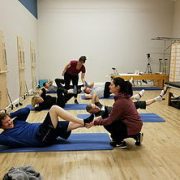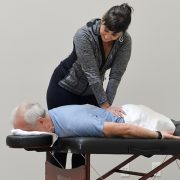3 Reasons You Need PT After Minimally Invasive Spine Surgery
Minimally invasive spine surgery (MISS) started to take off in the 1990’s. It has since become far more common for spinal conditions. Some being degenerative disc disease, herniated discs, spinal stenosis, scoliosis, spinal infections, spondylolisthesis, compression fractures, and spinal tumors.
Minimally Invasive Spine Surgery is a far better alternative to open-spine surgery.
You can expect less anesthesia and less blood loss during surgery. Along with a reduced risk of infection, less pain after surgery, less pain medication needed, smaller scars, shorter hospital stays, faster recovery time, and quicker return to daily activities and work.
But don’t confuse the term “minimally invasive” with minimal risk.
With MISS – you’re still at risk for many of the same consequences of open-spine surgery should things go wrong. Therefore, you want to make sure you really need spine surgery before you go “under the knife” – even if it’s a tiny one.
There are some risks of MISS:
- Bad reactions to anesthesia
- Pneumonia after surgery
- Blood clots in your legs that could travel to your lungs
- Infection (although this is significantly minimized with MISS)
- Blood loss during surgery requiring a transfusion
- Injury to the nerves of your spinal cord
While rare, these are very real risks and they do happen. Risks like this don’t occur with conservative treatment – such as specialized physical therapy.
It’s why I’m a huge advocate of folks not undergoing surgery until all conservative approaches have been exhausted. Or if you’ve got what we call a progressive neurological deficit occurring. Such as quick deterioration in your muscle strength, ability to walk, or ability to control your bowel/bladder.
All that being said – assuming you really do need surgery and will benefit from MISS – you still need physical therapy.
I’m amazed at how many surgeons no longer prescribe rehab after a minimally invasive procedure. Just because recovery time is reduced – doesn’t mean you don’t need a specialist to help you recover properly.
Here are 3 reasons you need PT after minimally invasive spine surgery:
1. Proper scar management
Minimally invasive procedures already do a great job of reducing scar formation. The incisions are smaller and less invasive, but there is still an incision. And the incision with MISS is deep because you have to get to the layers of the spinal nerves, vertebrae, and discs. Because the scars are small, people mistakenly assume they will heal without issue. The truth is they might. But the odds of your scar healing properly are much better with professional scar management. Scar mobilization should begin about 2 wks after MISS.
A specially trained physical therapist will not only help you manage your scar healing, but teach you how to do it on your own. You’ll improve blood flow to the area of the incision (which promotes healing), increase soft tissue mobility, and help reduce any swelling that formed in the area.
2. Restore pre-existing impairments
Odds are pretty good you didn’t end up with spontaneous MISS. You likely had a long road leading to your surgery. It’s critical you go back and address all of the problems that occurred prior to your procedure.
This includes everything from muscle weakness, to poor compensatory movement strategies your body adapted to deal with pain, immobility that occurred either because of pain or to protect you from pain, and residual numbness and/or radiating pain that is still in your legs. MISS might do a great job of quickly getting rid of your back pain, but something led to that pain to begin with.
The absence of pain does not equal the absence of a problem. Now is the perfect time to work with a specialist who will help you not only optimize your recovery from MISS – but make sure the problems/impairments that led you to the operating table to begin with don’t come back.
3. Restore deep core strength
Chronic pain tends to inhibit the ability for muscles to work properly. If you’ve been suffering from back pain for awhile – odds are pretty good your deep core strength is not where it needs to be.
Plus, good core strength is critical for the prevention of future back problems (yes – you can still get back pain after back surgery). Ideally, now that your minimally invasive procedure has either eliminated or significantly reduced your back pain, it’s more critical than ever to work with a specialist who can help you restore your deep core strength. They’ll know how to do it safely and effectively – to not only help you recover from your MISS faster – but keep the original problem from coming back – because it can.
If you’re considering any type of surgery – but especially back surgery – I always advocate getting a second opinion first – even if the procedure is minimally invasive. Eighty percent of the time – back problems can be resolved without surgical procedures.
CLICK HERE to get a second opinion from one of my specialists.
If you truly want to avoid surgery – and we think we can help you do that – we’ll let you know and get you scheduled with us as quickly as possible.
However, if you’ve recently undergone MISS, ask your doctor to refer you to physical therapy. Many surgeons won’t. It’s going to help you recover optimally and faster – and will set you up for the best possible future success when it comes to back problems.
Dr. Carrie Jose, Physical Therapist and Pilates expert, owns CJ Physical Therapy & Pilates in Portsmouth and writes for Seacoast Media Group. To get in touch, or request a free copy of her guide to back pain, email her at [email protected] or call 603-605-0402










